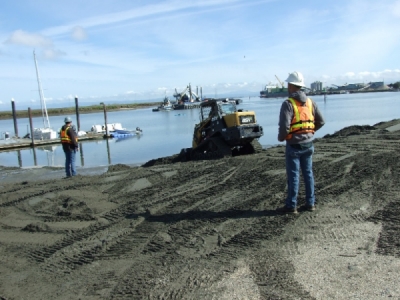
Posted on April 1, 2019
A marine educational nonprofit in Redwood City that had been struggling for years for permission to restore a beach so people can get to the water has received the final necessary permit – and more than 600 tons of sand.
The Marine Science Institute, which gives kids a chance to learn about the local bay environment, had had a $50,000 grant to repair the eroding beach but couldn’t proceed without a long-sought permit from the San Francisco Bay Conservation and Development Commission. The permit finally arrived in an email a few weeks ago, clearing the way for the delivery by barge late Monday of aggregate sand for 115 feet of freshened beach.
“I felt like opening a bottle of champagne last night,” Marilou Seiff, MSI’s executive director said, as she watched a large materials handler shaping the imported sand into a smooth surface Tuesday morning.
Why it took so long to get a permit from BCDC is a matter of debate. Brad McCrea, the agency’s regulatory director, contends that “lines of communication” between the two parties weren’t as open as they could have been. The best projects, he said, happen when everyone works collaboratively, but MSI resisted hiring a technical consultant with the right kind of coastal expertise.
“The good news is this is all behind us and the beach is open,” McCrea said late Tuesday. “We’re thrilled.”
Before the restoration, MSI’s oyster-shell beach had eroded so badly that people had to step over riprap, chunks of cement and a drop-off to get to the water, according to Jesús Jimenez, MSI’s aquarist and facilities engineer. “Now we have a nice gentle slope down to the waterline. It’s going to mean a huge difference both to kids that come out here every single day and to countless boaters who use the facility.”
Founded in 1970, the Marine Science Institute puts children and older students in direct physical contact with the bay, with instruction on land, the shore and on the water. MSI educates roughly 50,000 students and adults annually through its programs.
Seiff said MSI staff had assumed since it was an historic beach, getting needed approvals to restore it would just take a couple of weeks. It turned out to be closer to six years and required okays from a half dozen state and federal agencies.
Most were “really easy to work with,” she said. MSI had some issues with the U.S. Army Corps of Engineers, but BCDC kept asking for more and more information, Seiff said, including a study that examined the impact of a 100-year flood or rising sea levels.
A coastal engineer MSI consulted estimated that such a study could cost about $20,000 to $25,000 and still not answer BCDC’s questions. “Erosion happens,” she said. “It’s just a part of coastal communities. It’s just part of nature.”
Meanwhile, the beach was becoming almost unusable. At a BCDC board meeting in December, MSI board chair Andrea Aust put in an appeal to “expedite” the approval of the beach repair that the organization had been working on for five years. Aust told the commissioners that doing the work while school was out would be the ideal time. MSI was also worried about a requirement of the $50,000 grant that the money be spent by Dec. 31. Though the deadline passed, Seiff said MSI was able to get it extended.
BCDC finally agreed to drop the requirement for the erosion study, Seiff said, but insisted that a civil engineer sign off on MSI’s beach restoration plans. An engineer provided the sign-off on a pro bono basis, she said.
The BCDC’s McCrea said the beach project was a simple one and if MSI had gotten a civil engineer earlier, delays could have been avoided. When working along the shoreline in an erosion-prone environment, requiring an engineer who has been involved in coastal processes is “a reasonable requirement.”
McCrea said the engineer who MSI brought in pointed out ways to reduce erosion from nearby boats. BCDC wanted to ensure that the beach is “safe and that it persists and is long-lasting,” he said. He and other BCDC staff reached out to MSI by phone and email early this year with offers of assistance to get the permit issues resolved.
Seiff said staff turnover and manpower shortages, contributed to the lengthy approval process at various agencies. The office of U.S. Rep. Jackie Speier (D-Hillsborough) was “wonderful” in helping with logjams at both the Army Corps of Engineers and BCDC, Seiff said, but what finally seemed to get things moving at the latter agency was media coverage.
“That was when they started working with us,” Seiff said. MSI hopes to acquire more land to extend its beach access and considers the just-completed project “a pilot.”
Petaluma-based Lind Marine honored the price it had given years ago to restore the beach. “We’re absolutely thrilled to be a part of it,” said operations manager Skyler Coleman. “It’s a shame that it took so long and so many hoops to get it done.” But the company is happy to be part of something that is educating the next generation about marine life and taking care of it, he added.
Source: climaterwc.com





